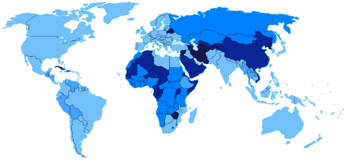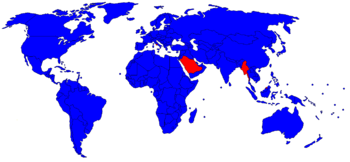Democracy Contents Elections | Kinds of democracy | History | Democracy and The Middle Class | Other | References | Navigation menu"BBC - h2g2 - Demokratia - the Athenian Democracy""Democracy Conference"Freedom in the World 2016"Exhibitions & Learning online | Citizenship | Struggle for democracy""Exhibitions & Learning online | Citizenship | Rise of Parliament"
Democracy
governmentcommunitydemocratic consolidationpoliticianspolitical partyageSuffrageprisonerscompulsoryfinedirect democracyreferendumnameindirectGreeksclassical AthenscitizenslaveswomenlotteryyearcandidatestonewoodleaderParliament of EnglandMagna CartaGlorious RevolutionBill of Rights 1689symbol
Democracy
Jump to navigation
Jump to search
A democracy means rule by the people.[1] The name is used for different forms of government, where the people can take part in the decisions that affect the way their community is run. In modern times, there are different ways this can be done:
- The people meet to decide about new laws, and changes to existing ones. This is usually called direct democracy.
- The people elect their leaders. These leaders take this decision about laws. This is commonly called representative democracy. The process of choosing is called election.[2] Elections are either held periodically, or when an officeholder dies.
- Sometimes people can propose new laws or changes to existing laws. Usually, this is done using a referendum, which needs a certain number of supporters.
- The people who make the decisions are chosen more or less at random. This is common, for example when choosing a jury for a trial. This method is known as sortition or allotment. In a trial, the jury will have to decide the question whether the person is guilty or not. In Europe, trials with a jury are only used for serious crimes, such as murder, hostage taking or arson.
To become a stable democracy, a state usually undergoes a process of democratic consolidation.
Contents
1 Elections
2 Kinds of democracy
3 History
3.1 Ancient origins
3.2 Middle Ages
4 Democracy and The Middle Class
5 Other
6 References
Elections |
After people hold an election, the candidates that won are determined. The way this is done can be simple: The candidate with the most votes gets elected. Very often, the politicians being elected belong to a political party. Instead of choosing a person, people vote for a party. The party with the most votes then picks the candidates.
Usually, the people being elected need to meet certain conditions: They need to have a certain age or a government body needs to determine that they are suitably qualified to perform the job.
Not everyone can vote in an election. Suffrage is only given to people who are citizens. Some groups may be excluded, for example prisoners.
For some elections, a country may make voting compulsory. Someone who does not vote, and who does not give a good reason usually has to pay a fine

The Polity IV data series is one way of measuring how democratic countries are. This map dates from 2013.

This map shows the findings of Freedom House's survey Freedom in the World 2016. The survey reports how much freedom countries had. Just because countries are the same color does not mean they are exactly the same.[3] Free (86) Partly Free (59) Not Free (50)

Democracy Index as published in January, 2007. The lighter the country, the more democratic it is.

Since World War II, countries have accepted the idea of democracy. This map shows which countries that call themselves democracies. The countries that do not include Saudi Arabia, Myanmar and North Korea; also the small countries of Cuba, Brunei and Vatican City Governments who see themselves as a democracy Governments who do not see themselves as a democracy
Kinds of democracy |
Democracy may be direct or indirect.
In a direct democracy, everyone has the right to make laws together. One modern example of direct democracy is a referendum, which is the name for the kind of way to pass a law where everyone in the community votes on it. Direct democracies are not usually used to run countries, because it is hard to get millions of people to get together all the time to make laws and other decisions. There is not enough time.
In an indirect, or representative democracy, people choose representatives to make laws for them. These people can be mayors, councilmen, members of Parliament, or other government officials. This is a much more common kind of democracy. Large communities like cities and countries use this method, but it may not be needed for a small group.
History |
Ancient origins |
This kind of government was developed long ago by the ancient Greeks in classical Athens. They had everyone who was a citizen (not slaves, women, foreigners, and children) get together in one area. The Assembly would talk about what kinds of laws they wanted and voted on them. The Council would suggest the laws. All citizens were allowed in the Assembly.
The Council were picked by draws (lottery). The participants in the Council would change every year and the number of people in the Council was at the most 500. For some offices the Athenian citizens would pick a leader by writing the name of their favorite candidate on a piece of stone or wood. The person with the most votes became the leader.
Middle Ages |
In the Middle Ages, there were many systems in which there were elections, although only a few people could join in at this time. The Parliament of England began from the Magna Carta, a document which said that the King's power was limited, and protected certain rights of the people. The first elected parliament was De Montfort's Parliament in England in 1265.
However, only a few people could actually join in. Parliament was chosen by only a few percent of the people (in 1780, fewer than 3% of people joined in).[4] The ruler also had the power to call parliaments. After a long time, the power of Parliament began to grow. After the Glorious Revolution in 1688, the English Bill of Rights 1689 made Parliament more powerful.[4] Later, the ruler became a symbol instead of having real power.[5]
Democracy and The Middle Class |
For a true Democracy to survive there must be a successful thriving middle class within to help with the balance of society. Without the middle class it is a two-sided war between the haves and the have not, the poor and rich, law makers and law-abiding citizens. The implementation of Democracy into countries that did not have an established middle class would be sent into war zones as it disrupted the normal cultural procedures. A country with a declining middle class sends areas neighborhoods into chaos. A chain of command that does not come low enough to reach the people that are setting regulations for. The idea of capitalizing of the miss fortunes of others and call it capitalism
[6]
Other |
- Majority rule
- Direct democracy
- [[Democratic and Nondemocratic
consolidation]]
- Political party
- Constitution
- Constitutional economics
- Political economy
- Election
- Rule of law
- Citizenship
- Activism
- Politics
References |
↑ "BBC - h2g2 - Demokratia - the Athenian Democracy". bbc.co.uk. Retrieved 13 July 2010..mw-parser-output cite.citationfont-style:inherit.mw-parser-output .citation qquotes:"""""""'""'".mw-parser-output .citation .cs1-lock-free abackground:url("//upload.wikimedia.org/wikipedia/commons/thumb/6/65/Lock-green.svg/9px-Lock-green.svg.png")no-repeat;background-position:right .1em center.mw-parser-output .citation .cs1-lock-limited a,.mw-parser-output .citation .cs1-lock-registration abackground:url("//upload.wikimedia.org/wikipedia/commons/thumb/d/d6/Lock-gray-alt-2.svg/9px-Lock-gray-alt-2.svg.png")no-repeat;background-position:right .1em center.mw-parser-output .citation .cs1-lock-subscription abackground:url("//upload.wikimedia.org/wikipedia/commons/thumb/a/aa/Lock-red-alt-2.svg/9px-Lock-red-alt-2.svg.png")no-repeat;background-position:right .1em center.mw-parser-output .cs1-subscription,.mw-parser-output .cs1-registrationcolor:#555.mw-parser-output .cs1-subscription span,.mw-parser-output .cs1-registration spanborder-bottom:1px dotted;cursor:help.mw-parser-output .cs1-ws-icon abackground:url("//upload.wikimedia.org/wikipedia/commons/thumb/4/4c/Wikisource-logo.svg/12px-Wikisource-logo.svg.png")no-repeat;background-position:right .1em center.mw-parser-output code.cs1-codecolor:inherit;background:inherit;border:inherit;padding:inherit.mw-parser-output .cs1-hidden-errordisplay:none;font-size:100%.mw-parser-output .cs1-visible-errorfont-size:100%.mw-parser-output .cs1-maintdisplay:none;color:#33aa33;margin-left:0.3em.mw-parser-output .cs1-subscription,.mw-parser-output .cs1-registration,.mw-parser-output .cs1-formatfont-size:95%.mw-parser-output .cs1-kern-left,.mw-parser-output .cs1-kern-wl-leftpadding-left:0.2em.mw-parser-output .cs1-kern-right,.mw-parser-output .cs1-kern-wl-rightpadding-right:0.2em
↑ "Democracy Conference". Innertemple.org.uk. Retrieved 2010-08-22.
↑ Freedom in the World 2016, Freedom House. Retrieved 28 January 2016.
↑ 4.04.1 "Exhibitions & Learning online | Citizenship | Struggle for democracy". The National Archives. Retrieved 2010-08-22.
↑ "Exhibitions & Learning online | Citizenship | Rise of Parliament". The National Archives. Retrieved 2010-08-22.
↑ Kaplan, Robert (December 1, 1997). "Was Democracy Just a Moment". Atlantic: 55-80.
Category:
- Democracy
(window.RLQ=window.RLQ||[]).push(function()mw.config.set("wgPageParseReport":"limitreport":"cputime":"0.152","walltime":"0.201","ppvisitednodes":"value":975,"limit":1000000,"ppgeneratednodes":"value":0,"limit":1500000,"postexpandincludesize":"value":9243,"limit":2097152,"templateargumentsize":"value":767,"limit":2097152,"expansiondepth":"value":13,"limit":40,"expensivefunctioncount":"value":0,"limit":500,"unstrip-depth":"value":1,"limit":20,"unstrip-size":"value":13152,"limit":5000000,"entityaccesscount":"value":0,"limit":400,"timingprofile":["100.00% 163.254 1 -total"," 93.41% 152.496 1 Template:Reflist"," 63.97% 104.432 4 Template:Cite_web"," 18.39% 30.021 1 Template:Cite_journal"," 13.71% 22.386 1 Template:Citation/core"," 3.63% 5.933 3 Template:Legend_inline"," 1.89% 3.081 1 Template:Main_other"," 1.85% 3.014 3 Template:Trim"," 1.57% 2.567 1 Template:Citation/make_link"," 1.39% 2.264 2 Template:Legend"],"scribunto":"limitreport-timeusage":"value":"0.062","limit":"10.000","limitreport-memusage":"value":2038540,"limit":52428800,"cachereport":"origin":"mw1332","timestamp":"20190325183959","ttl":2592000,"transientcontent":false);mw.config.set("wgBackendResponseTime":174,"wgHostname":"mw1264"););